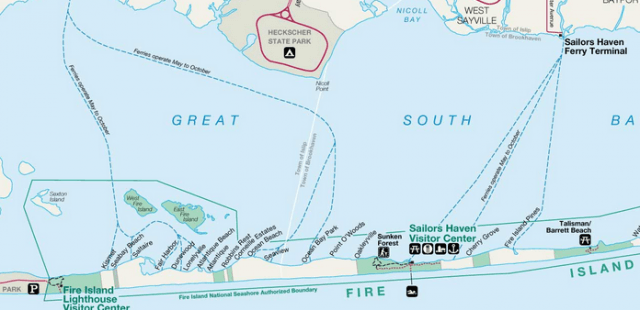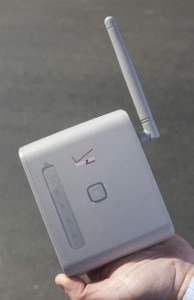
Verizon Voice Link
 The New York State Public Service Commission has announced it will hold public hearings in Ocean Beach in Suffolk County, N.Y. to hear from angry Fire Island residents and others about their evaluation of Verizon’s controversial wireless landline replacement Voice Link, which Verizon hopes to eventually install in rural areas across its operating territories.
The New York State Public Service Commission has announced it will hold public hearings in Ocean Beach in Suffolk County, N.Y. to hear from angry Fire Island residents and others about their evaluation of Verizon’s controversial wireless landline replacement Voice Link, which Verizon hopes to eventually install in rural areas across its operating territories.
“Verizon needs to stop lying,” said Fire Island resident Debi May who lost phone service last fall after Hurricane Sandy damaged the local network. “Don’t tell me you can’t fix my landline service. Tell me you won’t.”
She is one of hundreds of Fire Island residents spending the summer without landline service, relying on spotty cellular service, or using Verizon’s wireless landline alternative Voice Link, which many say simply does not work as advertised. In July, the CWA asserted Verizon is trying to introduce Voice Link in upstate New York, including in the Catskills and in and around Watertown and Buffalo.
“I’ve been on the phone with Verizon all day,” Jason Little, owner of the popular Fire Island haunt Bocce Beach tells The Village Voice. The restaurant’s phone line and DSL service is down again. Just like last week. And three weeks before that. Like always, Verizon’s customer service representatives engage in the futility of scheduling a service call that will never actually happen. Verizon doesn’t bother to show up in this section of Fire Island anymore, reports Little.
“They never come,” he says. So he sits and waits for the service to work its way back on its own — the result of damaged infrastructure Verizon refuses to repair any longer. Until it does, accepting credit cards is a big problem for Little.
It’s the same story down the street at the beachwear boutique A Summer Place. Instead of showing customers the latest summer fashions, owner Roberta Smith struggles her away around Verizon’s abandonment of landline service. She even purchased the recommended wireless credit card machine to process transactions, but that only works as well as Verizon Wireless’ service on the island, which can vary depending on location and traffic demands.
Smith tells the newspaper at least half the time, Verizon’s wireless network is so slow the machine stops working. If she can’t reach the credit card authorization center over a crackly, zero bar Verizon Wireless cell phone, the customer might walk, abandoning the sale.
National Public Radio reports Verizon’s efforts to abandon landline service on Fire Island and in certain New Jersey communities is just the first step towards retiring rural landline service in high cost areas. But does Verizon Voice Link actually work? Local residents say it doesn’t work well enough. NPR allows listeners to hear the sound quality of Voice Link for themselves. (5 minutes)
You must remain on this page to hear the clip, or you can download the clip and listen later.

Verizon’s decision is making life hard for Fire Island’s small businesses.
The Village Voice notes Verizon CEO Lowell McAdam didn’t make the decision to scrap rural copper wire landline service to improve things for customers. He did it for the company.
“The decision wasn’t motivated by customer demand so much as McAdam’s interest in increasing Verizon’s profit margins,” the Voice writes.
Tom Maguire, Verizon’s point man for Voice Link, has not endeared himself with local residents by suggesting Fire Island shoppers should get around the credit card problem by bringing cash.
“Remember what happened to Marie Antoinette when she said ‘let them eat cake’,” suggested one.
For some customers who appreciate the phone company’s cost arguments, Verizon’s wireless alternative wouldn’t be so bad if it didn’t work so bad.
“It has all the problems of a cellphone system, but none of the advantages,” Pat Briody, a homeowner on Fire Island for 40 years told NPR News.
“I don’t think there’s anyone who will tell you Voice Link is better than the copper wire,” says Steve Kunreuther, treasurer of the Saltaire Yacht Club.
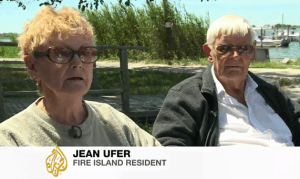
Jean Ufer says her husbands’ pacemaker depends on landline service to report in on his medical condition.
“Voice Link doesn’t work here,” reports resident Jean Ufer, whose husband depends on a pacemaker that must “check in” with medical staff over a landline the Ufer family no longer has. “It constantly breaks down. Everybody who has it hates it. You can’t do faxes. You can’t do the medical stuff you need. We need what we had back.”
Residents who depended on unlimited broadband access from Verizon’s DSL service are being bill-shocked by Verizon’s only broadband replacement option – expensive 4G wireless hotspot service from Verizon Wireless.
Small business owner Alessandro Anderes-Bologna used to have DSL service from Verizon until Hurricane Sandy obliterated Verizon’s infrastructure across parts of the western half of Fire Island. Today he relies on what he calls poor service from Verizon Wireless’ 4G LTE network, which he claims is hopelessly overloaded because of tourist traffic and insufficient capacity. But more impressive are Anderes-Bologna’s estimates of what Verizon Wireless wants to charge him for substandard wireless broadband.
“My bill with Verizon Wireless would probably be in the range of $700-800 a month,” Anderes-Bologna said. That is considerably higher than the $29.99 a month Verizon typically charges for its fastest unlimited DSL option on Fire Island.
Despite the enormous difference in price, Verizon’s Maguire has no problems with Verizon Wireless’ prices for its virtual broadband monopoly on the landline-less sections of the island.
“It’s a closed community,” he says. “It’s the quintessential marketplace where you get to charge what the market will bear, so all the shops get to charge whatever they want.” And that’s exactly what Verizon is doing.
WCBS Radio reports Verizon is introducing Voice Link in certain barrier island communities in New Jersey. But the service lacks important features landline users have been long accustomed to having. (1 minute)
You must remain on this page to hear the clip, or you can download the clip and listen later.
In nearby New Jersey, Verizon’s efforts to introduce Voice Link has met with resistance from consumer groups, the state’s utility regulator, and the Rate Counsel. Over 1,400 customers on barrier island communities like Bay Head, Brick, and Mantoloking cannot get Verizon DSL or landline service any longer because Verizon refuses to repair damaged landlines.

Tom Maguire
“The New Jersey coast has been battered enough,” said Douglas Johnston, AARP New Jersey’s manager of advocacy. “The last thing we need is second-class phone service at the Shore. We are concerned that approval of Verizon’s plans could further the gap between the telecommunications ‘haves’ and ‘have-nots’ and could create an incentive for Verizon to neglect the maintenance and repair of its landline phone network in New Jersey.”
In some cases, Verizon has told customers they can get landline phone service from Comcast, a competitor, instead.
State consumer advocates note that other utilities including cable operators have undertaken repair, replacement, and restoration of facilities in both New York and New Jersey without the challenges Verizon claims it has.
“Only Verizon, without evidentiary support, is seeking to jettison its obligations to provide safe, proper and adequate service to the public,” wrote the New Jersey Rate Counsel in a filing with the Federal Communications Commission.
New York Senator Phil Boyle, who represents Fire Island residents, is hosting a town hall meeting tonight to discuss the move by Verizon to replace copper-wire phone lines on Fire Island with Voice Link. The meeting will be held at the Ocean Beach Community House in Ocean Beach from 5-7pm.
The New York State Public Service Commission will be at the same location Saturday, Aug. 24 starting at noon for a public statement hearing to hear from customers about how Verizon Voice Link is working for them.
It is not necessary to make an appointment in advance or to present written material to speak at the public statement hearing. Anyone with a view about Voice Link, whether they live on the island or not are welcome to attend. Speakers will be called after completing a card requesting time to speak. Disabled persons requiring special accommodations may place a collect call to the Department of Public Service’s Human Resources Management Office at (518) 474-2520 as soon as possible. TDD users may request a sign language interpreter by placing a call through the New York Relay Service at 711 to reach the Department of Public Service’s Human Resource Office at the previously mentioned number.

Fire Island
Those who cannot attend in person at the Community House, 157-164 Bay Walk, Ocean Beach can send comments about Voice Link to the PSC online, by phone, or through the mail.
- E:Mail: [email protected]
- U.S. Mail: Secretary, Public Service Commission, Three Empire State Plaza, Albany, New York 12223-1350
- 24 Hour Toll-Free Opinion Line (N.Y. residents only): 1-800-335-2120
Your comments should refer to “Case 13-C-0197 – Voice Link on Fire Island.” All comments are requested by Sept. 13, 2013. Comments will become part of the record considered by the Commission and will be published online and accessible by clicking on the “Public Comments” tab.
[flv width=”640″ height=”380″]http://www.phillipdampier.com/video/Al Jazeera US islanders battle telecom giant 8-13-13.flv[/flv]
Al Jazeera reports Fire Island residents are fighting to keep their landlines, especially after having bad experiences with Verizon Voice Link. (3 minutes)


 Subscribe
Subscribe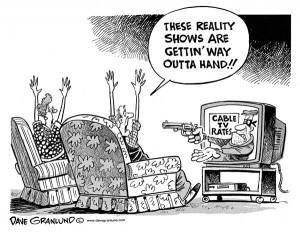 Although cable and phone companies love to declare themselves part of a fiercely competitive telecommunications marketplace, it is increasingly clear that is more fairy tale than reality, with each staking out their respective market niches to live financially comfortable ever-after.
Although cable and phone companies love to declare themselves part of a fiercely competitive telecommunications marketplace, it is increasingly clear that is more fairy tale than reality, with each staking out their respective market niches to live financially comfortable ever-after. This is hardly a “War of the Roses” relationship either. Wall Street teaches that price wars are expensive and competitive shouting matches do not represent a win-win scenario for companies and their shareholders. The two companies get along fine where Verizon has virtually given up on DSL. Time Warner Cable actually faces more competition from AT&T’s U-verse, which is not saying much. The obvious conclusion: unless you happen to live in a FiOS service area, the best deals and fastest broadband speeds are not for you.
This is hardly a “War of the Roses” relationship either. Wall Street teaches that price wars are expensive and competitive shouting matches do not represent a win-win scenario for companies and their shareholders. The two companies get along fine where Verizon has virtually given up on DSL. Time Warner Cable actually faces more competition from AT&T’s U-verse, which is not saying much. The obvious conclusion: unless you happen to live in a FiOS service area, the best deals and fastest broadband speeds are not for you. That means Time Warner Cable has an 80 percent market share. Actually, it is probably higher because that total number of households includes those who either don’t want, need, or can’t afford broadband service. Some may also rely on limited wireless broadband services from Clearwire or one of the large cell phone companies.
That means Time Warner Cable has an 80 percent market share. Actually, it is probably higher because that total number of households includes those who either don’t want, need, or can’t afford broadband service. Some may also rely on limited wireless broadband services from Clearwire or one of the large cell phone companies. Rochester remains a happy hunting ground for Internet Overcharging schemes because the only practical, alternative broadband supplier is Frontier Communications, which Time Warner Cable these days dismisses as an afterthought (remember that 80 percent market share). Without a strong competitor, Time Warner has no problem experimenting with new “usage”-priced tiers.
Rochester remains a happy hunting ground for Internet Overcharging schemes because the only practical, alternative broadband supplier is Frontier Communications, which Time Warner Cable these days dismisses as an afterthought (remember that 80 percent market share). Without a strong competitor, Time Warner has no problem experimenting with new “usage”-priced tiers.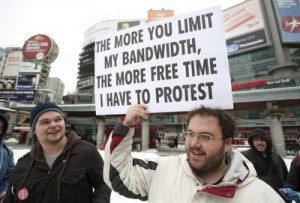 In nearby Ohio, the average broadband user already exceeds Time Warner’s 30GB pittance allowance, using 52GB a month. Under both plans, customers who exceed their allowance are charged $1 per GB, with overlimit fees currently not to exceed $25 per month. That 30GB plan would end up costing customers an extra $22 a month above the regular, unlimited plan. So much for the $5 savings.
In nearby Ohio, the average broadband user already exceeds Time Warner’s 30GB pittance allowance, using 52GB a month. Under both plans, customers who exceed their allowance are charged $1 per GB, with overlimit fees currently not to exceed $25 per month. That 30GB plan would end up costing customers an extra $22 a month above the regular, unlimited plan. So much for the $5 savings.
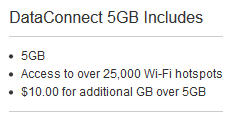 AT&T’s DataConnect plan, suitable for fixed wireless home use,
AT&T’s DataConnect plan, suitable for fixed wireless home use,  Attention broadband planners: Although broadband deployment strategies differ around the world, a new report decisively concludes there is only one network technology proven to meet the demands of broadband users both today and tomorrow: a national fiber optic network.
Attention broadband planners: Although broadband deployment strategies differ around the world, a new report decisively concludes there is only one network technology proven to meet the demands of broadband users both today and tomorrow: a national fiber optic network.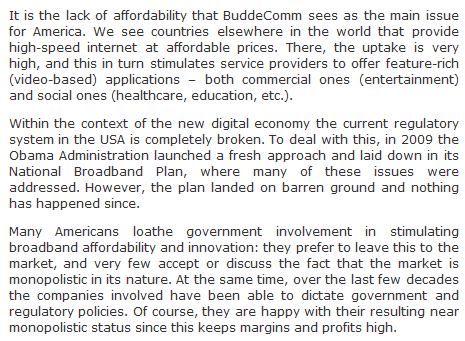
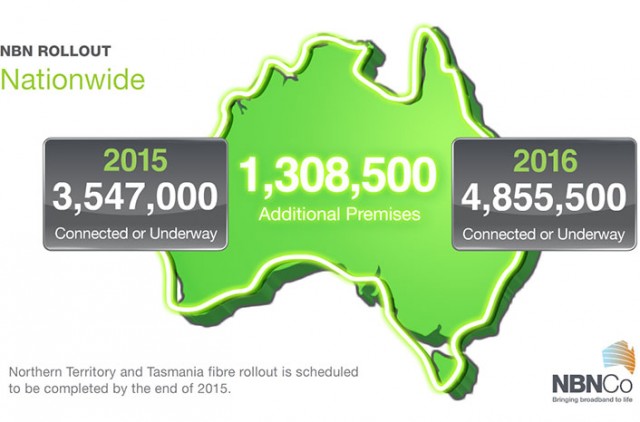
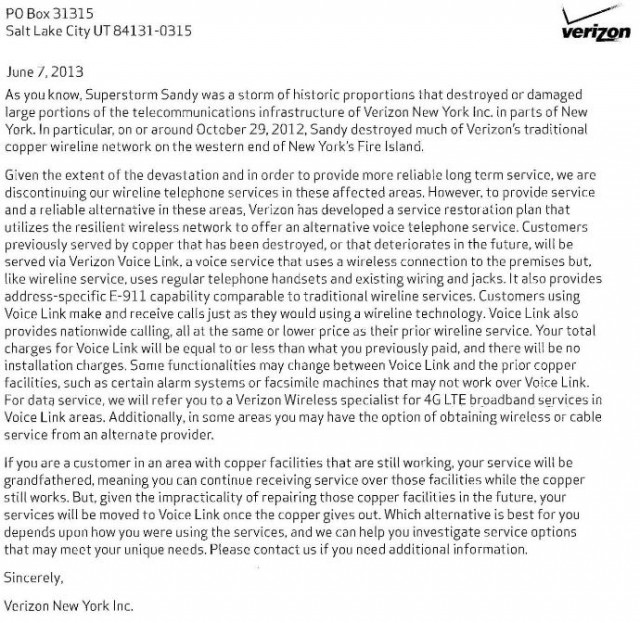
 Maguire was very careful to limit Verizon’s advocacy of Voice Link in terms of its capacity to handle voice calls. That is because Voice Link is currently incompatible with a whole range of important services that have worked fine with traditional landlines for years.
Maguire was very careful to limit Verizon’s advocacy of Voice Link in terms of its capacity to handle voice calls. That is because Voice Link is currently incompatible with a whole range of important services that have worked fine with traditional landlines for years.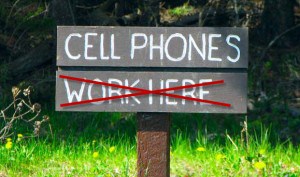 Residents advise visitors they better have Verizon Wireless and a robust phone that works well in challenging reception areas if they expect to use it while on the island. AT&T, Sprint, and T-Mobile customers are often out of luck. That poses an immediate and direct threat to public safety, according to public safety officials.
Residents advise visitors they better have Verizon Wireless and a robust phone that works well in challenging reception areas if they expect to use it while on the island. AT&T, Sprint, and T-Mobile customers are often out of luck. That poses an immediate and direct threat to public safety, according to public safety officials.
